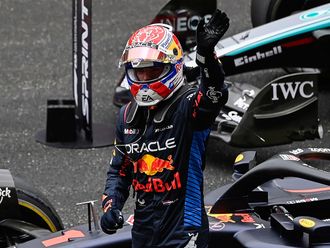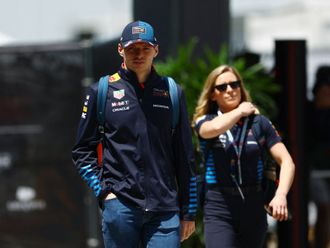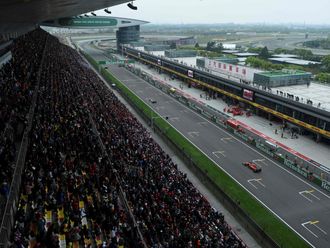The Formula One money-go-round has developed an ominous creak and it will take a massive re-think to lubricate it back to its smooth-running capacity.
Financial burdens, debts and delays have dismantled two of the backmarker teams to such a serious degree they had to withdraw from the United States grand prix this weekend.
Caterham and Marussia, two outfits that serve only to make up the numbers, are in such disarray they were forced to give Texas a miss. And, it is feared, it is unlikely they will return.
The situation cries out for a remedy before the financial ailment spreads even wider, to the likes of also-rans Lotus and Sauber, two more squads rumoured to be cash-strapped.
In fairness to him, Max Mosley, the former president of the FIA, the sport’s rulers, warned ages ago that this was a threatening situation.
When he was in office, he called for a budget cap on the crazily extravagant spending, up to $400 million (Dh1.5 billion) annually, by F1’s top teams like Ferrari, Red Bull, McLaren and Mercedes.
His plea was pooh-poohed by the high rollers, especially the mightily powerful and persuasive Ferrari. But, sadly, Mosley’s far-sighted prediction has come to fruition and grand prix overlord Bernie Ecclestone is forced to find a solution.
When trouble-torn Marussia and Caterham ventured into the grand prix ring four years ago, they did so on the undertaking from Mosley and Ecclestone that all the teams would be forced to operate on a budget limited to $60 million.
Money-loaded Ferrari rebelled and the others dutifully followed suit, so the proposed cap on the cash flow was ditched, much to Mosley’s disappointment and fears for the not-so-rich.
Now, his replacement Jean Todt, once the Ferrari main man, is under intense pressure to find an answer to the problem before any more teams find themselves in desperate straits.
“Something has to be done and it has to be done quickly,” says Mosley. “It’s a great shame my original proposals when I was in office were rejected. A budget cap was absolutely the right and proper and sensible thing to impose.
“It is clear that no sport can survive properly when some teams are spending four and five times more than the smallest set-ups. That way, there can never be a proper level of competition. And that makes it a nonsense.”
Urgently needed life-saving buyers are being sought for Caterham and Marussia, but the deeper complications will only serve to caution them on the idea of investing millions of dollars.
And Mosley repeats an old saying of his: “The problem is that the only way to make a small fortune in Formula One is to start with a large one.”
Across the years, since the world title chase began at Silverstone, UK, in 1950, more than 100 teams have arrived and disappeared. Many of them were not properly funded or just in it for the fun and glamour, and had to abandon the scene that had big money and possible debt written all over it.
Even missing out on winning the world championship, Ferrari will be paid around $150 million in a special deal arranged with Ecclestone’s CVC Capital Partners, the private equity group that controls F1.
Marussia and Caterham, even if they scrape through and survive, will be lucky to pocket a fraction of that sum from Ecclestone’s worldwide TV rights income.
The turmoil behind the scenes is the last thing Ecclestone would want as he celebrates his 84th birthday this week.
— The writer is a freelance journalist and motorsport expert












